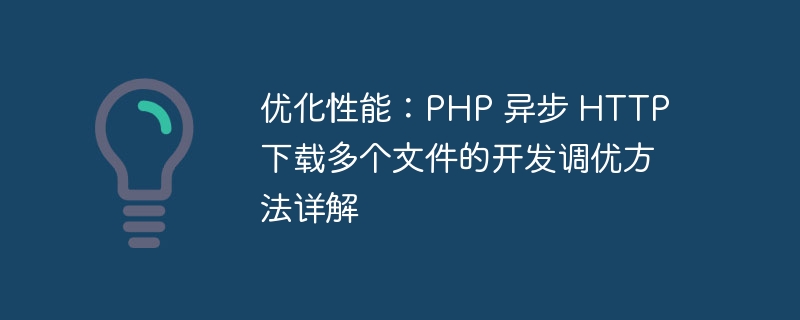
Optimizing performance: Detailed explanation of development and tuning methods for PHP asynchronous HTTP download of multiple files
With the development of the Internet, we increasingly need to handle a large number of file downloads Task. In PHP development, downloading multiple files via asynchronous HTTP can improve performance and efficiency. This article will introduce in detail the development and tuning methods of PHP asynchronous HTTP downloading of multiple files to help developers optimize performance.
- Using multi-threading or multi-process
In PHP, you can use multi-threading or multi-process technology to download multiple files asynchronously. Multithreading can be achieved through extensions such as pthreads, and multiprocessing can be achieved through the use of functions such as pcntl_fork(). In this way, multiple download tasks can be processed simultaneously and download efficiency can be improved.
- Using concurrency libraries
In order to more conveniently implement asynchronous downloading of multiple files, you can use some PHP concurrency libraries, such as Guzzle, ReactPHP or Swoole, etc. These libraries provide tools and interfaces to deal with concurrent requests, simplify the development process, and provide higher performance.
- Split file list
If the list of files that need to be downloaded is too large, you can split them into multiple smaller sublists and use multiple threads or processes to process different sublists at the same time. This improves concurrency performance and reduces download times.
- Using asynchronous operations
PHP 7 introduced the concept of asynchronous operations and provided the async and await keywords. By using these keywords, the download task can be turned into an asynchronous operation to improve efficiency. For example, you can use the asynchronous request method provided by Guzzle to initiate multiple file download tasks at once and wait for their results to be returned.
- Use connection pool
When downloading multiple files asynchronously, each download task needs to establish and disconnect connections. In order to avoid frequent connection establishment and disconnection operations, you can use connection pool technology to establish a certain number of connections in advance and reuse them. This reduces connection management overhead and improves performance.
- Increase the cache layer
In order to reduce unnecessary requests to the source server, you can add a cache layer during the download process. When the download task starts, it first checks whether a copy of the file already exists in the cache. If so, the file in the cache is used directly. This can avoid repeated downloads, reduce network transmission, and improve efficiency.
- Use compression technology
Using compression technology, such as gzip or deflate, in download tasks can reduce the size of the transferred file and increase the download speed. Both the server and the client need to support corresponding compression algorithms and set appropriate compression levels. Note that if the file is already in a compressed format, it is not recommended to compress it again.
- Monitoring and Tuning
During the development process, pay attention to the monitoring and tuning of download tasks. You can use monitoring tools to monitor indicators such as the time consumption and success rate of download tasks, and perform corresponding tuning operations based on the monitoring results. Common monitoring tools include Prometheus, Grafana, etc.
Summary
Asynchronous HTTP downloading of multiple files can improve the performance and efficiency of PHP programs. By using optimization methods such as multi-threading/processes, concurrency libraries, asynchronous operations, connection pools, caching layers, and compression technologies, download performance can be optimized, waiting times reduced, and user experience improved.
Although the development and tuning of asynchronous downloads requires certain technical requirements, once you master the above methods, you can make full use of the advantages of the PHP asynchronous model to achieve efficient file download tasks. I hope this article provides some valuable reference and inspiration for PHP developers in optimizing performance.
The above is the detailed content of Optimizing performance: Detailed explanation of development and tuning methods for PHP asynchronous HTTP download of multiple files. For more information, please follow other related articles on the PHP Chinese website!

